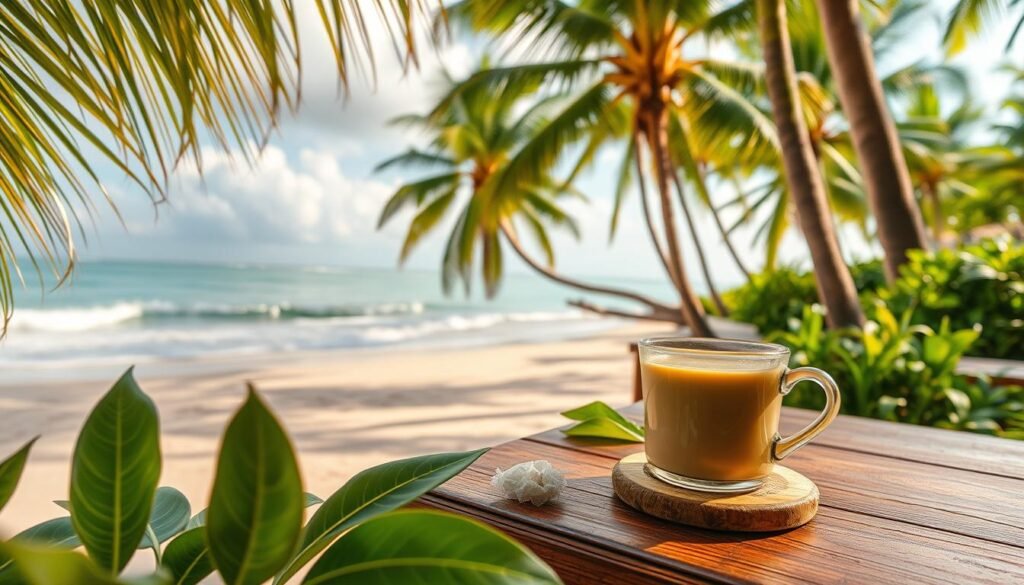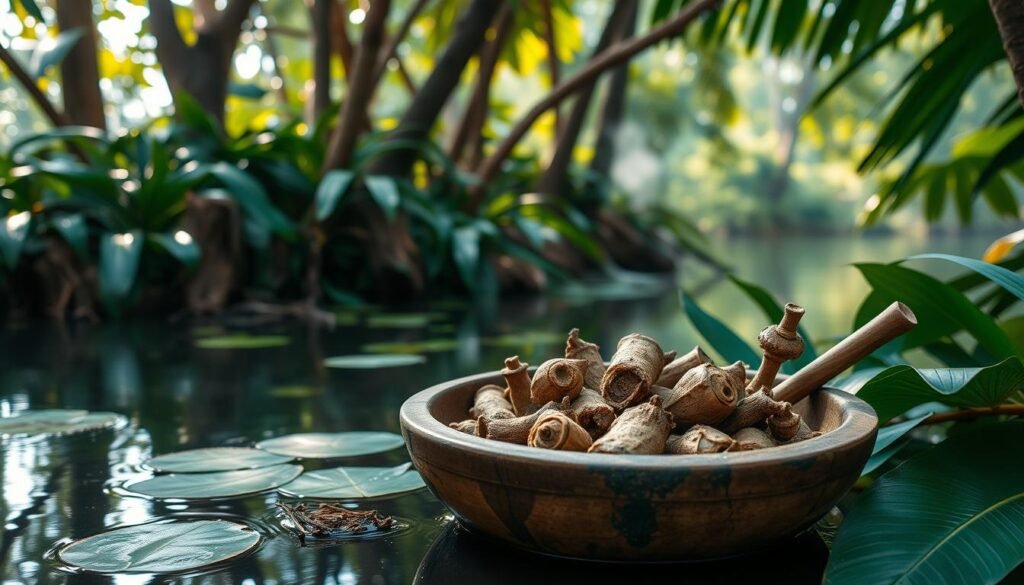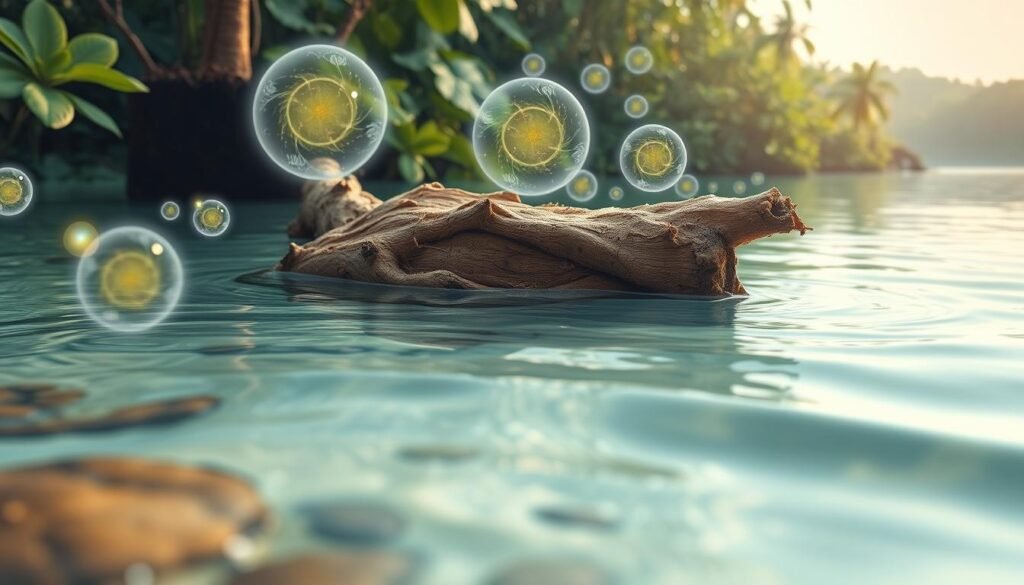Did you know more than 30% of people with Generalized Anxiety Disorder (GAD) might not get the help they need? The search for effective treatments has led to kava, a plant from the Pacific Islands known for its calming effects. Kava comes from the root of the Piper methysticum plant. Many believe it helps lessen anxiety symptoms.
This article reviews kava’s benefits for dealing with anxiety. We’ll look at its history, active ingredients, and role in today’s health care. Understanding kava’s use in easing anxiety can open new ways to improve wellness. For more on this herb, visit this resource.
Key Takeaways
- Kava has been traditionally used for centuries, particularly in managing anxiety.
- Clinical studies have shown kava’s effectiveness in reducing anxiety symptoms significantly.
- Over 30% of those with GAD do not receive adequate therapy, making alternative remedies like kava essential.
- Kava contains kavalactones, which contribute to its calming properties.
- While kava may offer relief, caution is advised due to potential side effects and interactions.
What is Kava?
Kava comes from the South Pacific. It is known for its root that you grind. Then, you mix it with water to make a soothing drink. This drink is a key part of social events and ceremonies. It helps people relax and connect with each other. Kava has been significant in culture for hundreds of years. Nowadays, many turn to kava to ease anxiety, valuing its power to calm.
The Historical Significance of Kava
For years, kava has been essential for social life in the Pacific Islands. Known as ‘awa, yagon, and Awa, it’s more than a beverage; it’s a tradition. Drinking kava creates a community feel, drawing people closer. Its calming effect is cherished, making it popular for relaxation and bonding.
| Aspect | Details |
|---|---|
| Plant Origin | Native to the South Pacific |
| Common Names | Awa, Yagon, Awa |
| Historical Use Duration | Spanning hundreds of years |
| Main Component | Kava root |
| Cultural Role | Facilitates communication and bonding |
| Typical Use | Social and ceremonial occasions |
Understanding the Benefits of Kava
Kava is great for emotional wellness. It helps reduce anxiety, making it popular among those looking for natural solutions. Its ability to ease stress and increase relaxation is well-noted. This has made kava a modern favorite, often chosen over common medications. Studies have found it can improve mood and brain function, especially in reducing kava anxiety relief.
Kava’s Role in Modern Health Practices
Kava is becoming a key player in natural anxiety relief. It’s known to help with generalized anxiety disorder and social fears. Bosner (2001) found it significantly lowers anxiety in patients. This makes kava a top choice for boosting relaxation and brain performance.
Pittler and Ernst (2002) showed kava works better than placebos in treating anxiety. Even small amounts of kavalactones, its active components, are highly effective. According to this source, kava also improves sleep and reduces stress, which supports emotional health.

Kava does have some risks, like possible liver damage. However, using it correctly and sticking to safe amounts minimizes these risks. With more research, kava’s benefits for anxiety relief are becoming more recognized. It highlights the importance of natural remedy options.
Kava for Anxiety: Traditional Uses and Modern Applications
Kava is steeped in South Pacific traditions, known for its soothing properties. It played a vital role in social and religious gatherings, helping manage anxiety. Now, kava is catching attention for its mental health benefits, especially in controlling anxiety disorders.
Evolving Perceptions of Kava in Society
Kava is now seen as a natural solution for kava for anxiety. Many believe it eases general anxiety disorder symptoms (GAD). This belief has fueled the growth of kava bars. Here, people enjoy drinks laced with kava.

However, kava’s rise brings health concerns, especially liver risks. The CDC and FDA warn about its safety when mixed with alcohol or drugs. Even though kava helps with anxiety, we must use it wisely. It’s crucial to balance its traditional roots with modern research.
There’s a growing trend toward herbal remedies for mental wellness. This reflects a shift towards natural methods for health care. As interest in kava spikes, education about its safe use is essential. Awareness of its history and effects will help users make informed decisions.
To learn more about the importance of kava in history and its modern role, read more here.
The Active Ingredients in Kava: Kavalactones Explained
Kava is popular for easing anxiety, thanks to active parts called kavalactones. These parts help the brain and make you feel relaxed without feeling foggy, unlike alcohol.
The Chemistry Behind Kava’s Effects
Kavalactones, the main components in Kava, act on the brain to reduce anxiety. Studies show they work like certain anxiety meds but keep your mind clear. This explains Kava’s power to calm anxiety.
About 15 kavalactones are in Kava, but six are most important. They are responsible for 96% of its healing effects. Below is a table with these six key kavalactones and their effects:
| Kavalactone | Effects | Properties |
|---|---|---|
| Kavain | Promotes relaxation and reduces anxiety | Central nervous system effects |
| Dihydrokavain | Enhances mood | Central nervous system effects |
| Methysticin | Neuroprotective properties | Anti-anxiety |
| Dihydromethysticin | Calming effects | Anti-anxiety |
| Yangonin | Potential hepatoprotective benefits | May protect the liver |
| Desmethoxyyangonin | Supports relaxation | Central nervous system effects |
Research, like what’s found in this article, dives into kavalactones’ role in easing anxiety. Kava is great for staying clear-headed and relaxed. But, it’s important to use it carefully because of possible liver risks.

How Kava Works: Mechanisms of Action Against Anxiety
Kava is known for helping with anxiety symptoms. Its active components target the brain’s GABA system. This interaction boosts relaxation and lowers anxiety, offering a natural remedy choice.
Neurochemical Responses to Kava
Kava’s effects on anxiety are well-studied, showing its influence on the nervous system. It has six main kava lactones that impact neurotransmitter pathways. These lactones help calm the mind and stabilize emotions, similar to anti-anxiety drugs.
- Kava has mild anticonvulsant and antispasmodic effects in animal tests.
- It is known for its success in treating general anxiety and aiding stress management.
- Clinical studies have highlighted standardized kava extracts’ effectiveness in reducing anxiety without mental slowdown at proper doses.
However, kava use comes with a note of caution due to possible side effects. There are FDA warnings about kava and liver damage, urging consultations for those with liver issues or pregnant/breastfeeding women.
Studies confirm kava’s efficiency in reducing anxiety at correct dosages, outdoing placebos. But, it’s crucial to note possible drug interactions, particularly with sedatives, which could increase drowsiness.
| Property | Details |
|---|---|
| Kava Lactones | Six major kava lactones act upon the nervous system. |
| Effects on Anxiety | Kava shows effectiveness in managing generalized anxiety and stress levels. |
| Dosage | Recommended daily doses range between 100 mg to 300 mg for optimal results. |
| Safety Concerns | FDA warnings regarding liver damage necessitate healthcare consultations. |
| Interactions | Amplification of effects noted when combining kava with CNS depressants. |
Recommended Kava Dosage for Managing Anxiety
Finding the right kava dose is vital to get its benefits safely. Everyone is different, so responses to kava vary. Studies suggest doses of 20 to 300 milligrams (mg) of kavalactones a day can ease anxiety. It’s important to follow kava supplement advice for the best and safest use.
Finding the Right Dosage for Individual Needs
For adults, the daily recommended kava amount is 60 to 250 mg. Research shows this can help with anxiety disorders like GAD. Still, it’s crucial to use kava wisely to avoid any risks.
- Limit the daily kava dosage to no more than 250 mg.
- Avoid use for longer than three months without a break.
- Consult a healthcare professional for personalized dosage recommendations.
Countries and the FDA have warned about kava and liver damage. Sticking to safe kava habits is key. Make sure your dose is right for your health, keeping liver safety in mind.
The Best Forms of Kava: Tea, Extracts, and Supplements
Kava comes in different forms to fit everyone’s needs and lifestyle. Each way you use kava affects your experience differently. It’s important to know the best types to choose what’s right for you.
How to Consume Kava Effectively
Choosing between kava tea, supplements, or other forms depends on what you like and what effect you’re after. Here are some common forms of kava and how they work:
- Kava Tea: This traditional method offers a calming effect and is great for hanging out with friends. Typically, it takes between 30 minutes to two hours to feel the effects. It’s a popular choice for winding down.
- Kava Powders: You can make a drink with these powders at home. Just mix the powder with water. Many find this method authentic and satisfying.
- Kava Extracts: In liquid or powder form, kava extracts pack a punch with concentrated kavalactones. They are great for people on the go who need something quick and easy.
- Kava Supplements: Capsules make taking kava very straightforward, ensuring you get the right amount without having to prepare anything. It’s perfect for those who value consistency.
The choice of kava form really comes down to your lifestyle, taste, and convenience. Knowing how each type works helps you pick the best one to reduce anxiety and relax.
| Form of Kava | Pros | Cons |
|---|---|---|
| Kava Tea | Relaxing, social experience | Time-consuming preparation |
| Kava Powder | Authentic, customizable | Needs preparation and might taste strong |
| Kava Extracts | Convenient, fast effects | Can cost more |
| Kava Supplements | Easy dosing, simple to take | Lacks traditional aspect |
Potential Side Effects and Risks of Kava Use
Kava has become popular as a way to naturally fight anxiety. However, it’s important to know about its side effects and dangers. While it’s usually okay for short-term use, there can be negative effects. People with health problems should be extra cautious.
Ensuring Safe Consumption Practices
Moderate use of kava is typically safe, but problems can arise with long-term use. Using too much kava can lead to mood changes, lack of interest, and dry, scaly skin. Long-time users might face kava dermopathy or even malnutrition due to less hunger. The most severe danger is liver damage, especially from alcoholic or acetonic extracts. Kava made with water is a safer choice.
Combining kava with alcohol raises the risk of hurting the liver and can make you drunk faster. This poses more health risks. Using kava with certain drugs can create unexpected effects and increase drowsiness. People with liver problems, pregnant women, or nursing mothers should steer clear of kava. The effects on pregnancy aren’t well-known.
Below is a guide to safer kava use:
| Recommendation | Description |
|---|---|
| Consult Healthcare Professionals | Talk about your health and possible bad reactions with a doctor before starting kava. |
| Moderate Consumption | Limit use to avoid building a tolerance and facing negative effects. |
| Avoid Mixing Substances | Don’t mix kava with alcohol or other depressants to dodge higher risks. |
| Use Quality Products | Pick high-quality kava to lessen liver toxicity dangers. |
| Be Cautious with Long-Term Use | Watch for mental or physical side effects over time. |
Knowing the potential kava side effects helps you make wise choices about using this herb. Sticking to kava safety guidelines is key to enjoying its benefits without risking your health.
Conclusion
Kava is gaining interest as a natural way to ease anxiety. It comes from tradition and is now being studied for its benefits. Some research, including a big review of seven studies, shows kava might really help. It seemed to make a difference in anxiety levels compared to fake treatments.
But, we should be careful when considering kava. Although it looks promising, we need more studies. These should look at its safety over time and how it works for different people. If you’re thinking about trying kava, talk to a doctor first. They can guide you based on your health.
Kava’s potential to help with mental health is interesting. For more info, check out this summary of kava benefits and other herbs. Kava, along with a holistic approach, might help achieve peace and well-being.